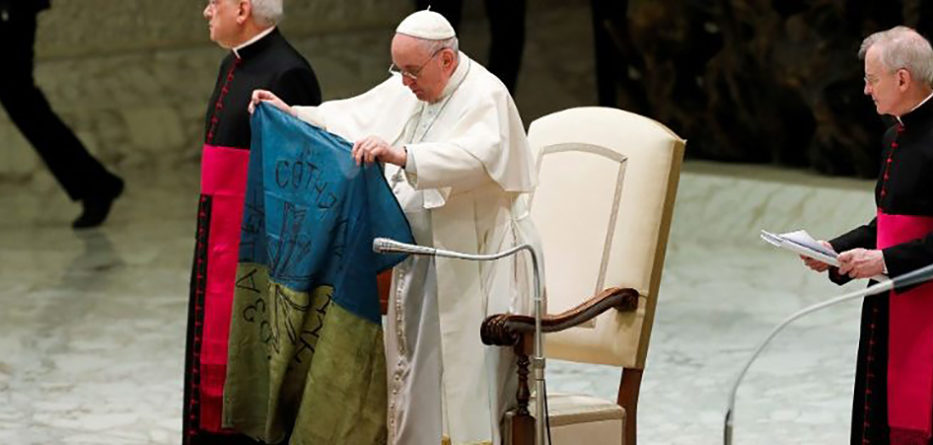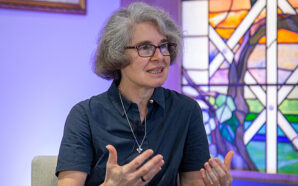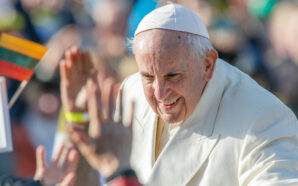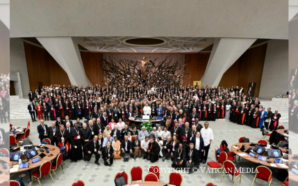Pope Francis has condemned the war in Ukraine in strong words, dismissing Russian President Vladimir Putin’s use of the euphemism “military operation” and referring to a “sacrilegious” war that is causing “death, destruction, and misery.” But as the head of the Catholic Church and of the Holy See’s diplomatic efforts he has not confronted Mr. Putin directly. In contrast to President Joseph R. Biden, Francis has avoided any direct mention of “Putin” or “Russia” in his speeches about the war. Yet in a speech in Malta on April 2, he referred to “some potentate, sadly caught up in anachronistic claims of nationalist interests, [who] is provoking and fomenting conflicts”—a thinly veiled reference to the Russian president.
Again, speaking indirectly of Russia, Francis reflected in his speech in Malta that “We had thought that invasions of other countries, savage street fighting and atomic threats were grim memories of a distant past.” Nonetheless, his moral condemnations do not reference what many see as Mr. Putin’s appalling abuse of power against a militarily inferior nation, nor does he speak of Ukraine’s innocence in comparison to Russia’s breaches of international law. The pope does not take as his point of departure the enormous power asymmetry between the two states, nor does he say that blame the lies with Goliath rather than David.
Although it has bilateral relations with nearly every country in the world, including Russia, the Holy See does not regard itself as a state with a territory to protect; its primary role is to serve as a peacemaker. By refraining from explicitly condemning Russia and Mr. Putin’s regime, Pope Francis hopes to create a space in which the church’s peace-oriented diplomacy can have an effect at a decisive point in time. This is in keeping with the longstanding diplomatic practices of the Holy See, which, as Nicole Winfield writes for The Associated Press, “has a tradition of quiet diplomacy, believing that it can facilitate dialogue better if it doesn’t take sides or publicly call out aggressors.”
In his video conference with the head of the Russian Orthodox Church, Patriarch Kirill, Francis emphasized how, by virtue of the faith leaders’ roles as representatives of Jesus, they should forgo all advocacy of armed force. In this way he has tacitly upbraided the patriarch for encouraging Mr. Putin in his war against Ukraine. In a moving prayer, the pope asked God to forgive Christian supporters of Mr. Putin (including, by extension, Patriarch Kirill), likening them to Cain: “Forgive us, if we continue like Cain to pick up the stones of our fields to kill Abel. Forgive us, if we continue to justify our cruelty with our labors, if we legitimize the brutality of our actions with our pain.”
The pope wants to prevent the conflict between East and West from being framed as a religious one. Hence, he avoids statements that could create the impression that he is defending a Western Catholic territory against an Eastern Orthodox territory, or Ukrainian Catholics against Russian Orthodox. He holds that this in no way is a religious war, either on the Russian side (despite Mr. Putin’s claim that his aims are to protect ethnic Russians from “genocide” and to defend the Moscow-aligned Orthodox church) or on the side of the Ukrainians (who are fighting first and foremost for their nation’s sovereignty). Francis’ speeches accordingly emphasize the suffering of this war’s many victims—mostly Ukrainian, but also Russian—rather than asserting the Ukrainian people’s right to self-defense or proclaiming its armed resistance to be a Christian duty.
To continue reading this article, click here.
For other perspectives, read “We have a moral duty to protect Ukrainian civilians—but that doesn’t mean going to war with Russia,” “Just war theory and Ukraine: Why military action against Russia is justifiable,” or see all of America’s coverage of the Ukraine crisis.
Gregory M. Reichberg is a research professor in international ethics at the Peace Research Institute Oslo and a consultor to the Holy See’s Dicastery for Promoting Integral Human Development.
Ole Jakob Løland is a postdoctoral researcher at the Theological Faculty, University of Oslo.
With thanks to America and Gregory M. Reichberg and Ole Jakob Løland, where this article originally appeared.








